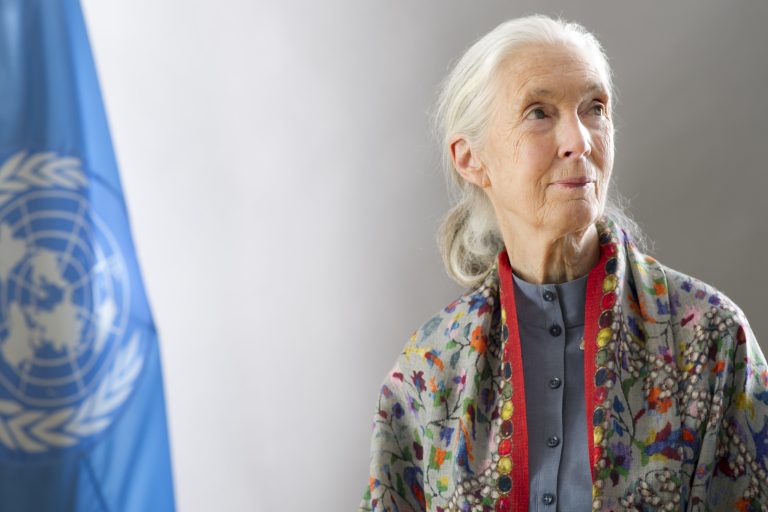
Photo: United Nations Messenger of Peace Jane Goodall, 2015. Credit: U.N. Photo/Mark Garten.
United Nations, New YorkPhoto # 643362
New York, N.Y. As a global citizen and thought leader, Jane Goodall’s life and work have left an indelible mark on both the scientific community and the broader world. Born on April 3, 1934, in London, Goodall’s journey from a curious child with a passion for animals to a pioneering primatologist and tireless advocate for conservation is nothing short of inspiring.
Growing up in a household that encouraged her curiosity about the natural world, Goodall was deeply influenced by her mother, who nurtured her interest in animals from a young age. This supportive environment laid the groundwork for what would become a groundbreaking career in primatology. At a time when the field was predominantly male-dominated, Goodall’s achievements stand out not only for their scientific significance but also for their role in breaking gender barriers in science.

In 1960, at just 26 years old, Goodall embarked on what would become her life’s work: the study of wild chimpanzees in Gombe Stream National Park, Tanzania. Without formal academic training in primatology, she brought a fresh perspective to the study of animal behavior.
Her observations of chimpanzees using tools, previously thought to be a uniquely human trait, revolutionized our understanding of primates and challenged the rigid boundaries that were believed to separate humans from other animals.
Goodall’s methodological approach, characterized by patient observation and a deep empathy for her subjects, allowed her to uncover complex social structures and behaviors within chimpanzee communities. Her work underscored the importance of individual personality and emotional depth among non-human primates, fostering a greater appreciation for the complexity of animal life.
Beyond her scientific contributions, Goodall’s commitment to conservation has been unwavering.
Witnessing the deforestation and habitat destruction that threatened the chimpanzees she studied, Goodall became a vocal advocate for environmental protection. She founded the Jane Goodall Institute in 1977 to promote wildlife research, education, and conservation. The Institute’s work extends far beyond the study of chimpanzees, encompassing global efforts to protect biodiversity and promote sustainable development.
One of Goodall’s most impactful initiatives is the Roots & Shoots program, established in 1991. This youth-driven organization empowers young people to engage in conservation and humanitarian efforts in their communities. Through Roots & Shoots, Goodall has inspired countless young individuals to become proactive stewards of the environment, fostering a new generation of conservationists.
Goodall’s influence as a thought leader extends into the realms of public policy and global advocacy.
She has addressed the United Nations on multiple occasions, bringing attention to critical issues such as climate change, deforestation, and animal welfare. Her ability to connect with diverse audiences—from world leaders to schoolchildren—has been instrumental in raising awareness and driving action on environmental issues.
In her role as a global citizen, Goodall exemplifies the principle of interconnectedness. She advocates for a holistic approach to conservation that recognizes the links between environmental health, human well-being, and sustainable development. Her work emphasizes that the protection of natural habitats and species is not just an ecological imperative but also a crucial component of social and economic stability.
Goodall’s dedication to ethical living and her profound respect for all forms of life are evident in her personal choices. A committed vegetarian, she promotes plant-based diets as a means to reduce environmental impact and improve animal welfare. Her life and work are a testament to the power of compassion and the impact that one dedicated individual can have on the world.
Throughout her career, Goodall has received numerous accolades, including the Kyoto Prize, the Benjamin Franklin Medal in Life Science, and the Templeton Prize. She has also been appointed a Dame Commander of the Order of the British Empire (DBE). These honors reflect not only her scientific achievements but also her tireless advocacy for the planet and its inhabitants.
Jane Goodall’s legacy is one of hope and resilience.
Her story is a powerful reminder that meaningful change often begins with a single individual’s passion and determination. Goodall’s life’s work has not only transformed our understanding of chimpanzees but has also galvanized global efforts to protect our planet’s precious ecosystems. Her vision of a world where humans live in harmony with nature continues to inspire and guide countless individuals and organizations around the globe.
As we face mounting environmental challenges, Jane Goodall’s example serves as a beacon of hope and a call to action. Her belief in the capacity of individuals to effect change, combined with her relentless pursuit of knowledge and justice, makes her a true thought leader and global citizen. Goodall’s enduring impact on science, conservation, and global advocacy underscores the profound difference one person can make in the world.
From the Forests of Gombe to Global Advocacy: Jane Goodall’s Unwavering Commitment to Conservation (June 15, 2022)
#JaneGoodall #Conservation #Primatology #EnvironmentalAdvocate #RootsAndShoots #GlobalCitizen
TAGS: Jane Goodall, primatology, conservation, environmental advocacy, Gombe Stream National Park, Jane Goodall Institute, Roots & Shoots, biodiversity, sustainable development, climate change, chimpanzee research, animal welfare, United Nations, global sustainability.